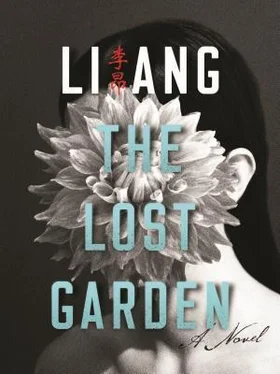But it required Mudan’s help to get Luohan to talk. Usually, after finishing his work in the garden, he would squat by the wall and smoke his pipe, the crackling the only audible sound around. On this day Yinghong squatted beside him to hear the stories.
Luohan began with the ocean, how the water was white when the boat first left the Mainland for Taiwan, but turned blue as the journey progressed. Then the boat would cross the “red ditch,” where the water was as red as the rouge on women’s faces. This was when the boatmen began tossing spirit money into the water in exchange for a safe passage. After the red ditch came the most treacherous black ditch, with rapid currents and deep gulches far below, where black water surged. If there was a southwesterly wind, the water turned into giant eddies, and the slightest error could send the boat wayward. The boatmen tossed in so much spirit money that the surface of the ocean was blanketed with paper; but once they were lucky enough to cross the ditch, Taiwan was not far off.
Luohan would usually follow the boat ride with stories of shipboard murders for the passengers’ valuables. Transporting several hundred people in a leaky boat, the bandits, who were seasoned sailors, would order their passengers into the cabin and seal them inside. They would set off in the dead of the night and, when they were well into the ocean, the overcrowded leaky boat would naturally begin to sink. Another ruse was to take the passengers to a sandbar, which they claimed to be Taiwan, and tell them to get off. Not knowing what was happening, the travelers got off and drowned when the tides rose.
These were the scariest stories, which he told succinctly, but with terrifying effect, since his brief narration left so much room for her imagination to run wild. She came to fear the water in the Taiwan Straits, which, contrary to the clear blue described in books, was eerie red, like rouge, or black, like ink, both unusual ocean colors that were predictably strange and frightening.
After hearing these tales, she was afraid to get up at night and had to get Mudan to accompany her when she needed to use the toilet. When he got wind of that, Father would not allow Luohan and Mudan to tell her such stories again.
The last story she heard was about a battle between the pirates and Qing soldiers. Following his usual narrative style of few details, Luohan described how, when the people from both sides began to fight, the colors in the sky were clear, red on one side and blue on the other. Over the first few days, the sky quickly turned blood red, which lasted several days and nights, pressing down as if setting the land on fire as well. Now everyone knew that the pirates were winning, forcing the Qing soldiers back. Only a sliver of blue remained in the sky, on the verge of being swallowed up by red. But it was clear that the blue side was not destined for destruction yet, for the last shred of blue was able to hold off the attack and slowly gain ground inch by inch, restoring its blue dominance. Everyone knew that the Qing navy had regained control, and the sky was once again divided into red and blue. More battles, and the sky parted down the middle; the red would advance only to be beaten back by the blue. In the end the blue side won, and people knew that the pirates had been defeated.
Later, Father produced logical and reasonable explanations for everything. For instance, the water in the red and black ditches was not really red or black. The black current was affected by seasonal winds that produced eddies, altering the color of the waves. And the battle between the soldiers and the pirates did not change the colors of the sky. That was caused by burning cargo boats, setting the distant sky ablaze. Nonetheless, Yinghong could never get over her fears instilled by the eerie image of the sky divided down the middle, red on one side and blue on the other, as the combatants fought. Sometimes she dreamed about the destructive, frightening battle of colors in the sky, dreams that returned after Lin Xigeng told her he was leaving her.
Father’s alternate explanation for the pirates helped eliminate her nagging concerns. At the time, he had just finished removing the pines and oaks in the garden, and their replacements, the flame trees, were in full bloom. He had also begun repairing the roofs of the several pavilions and towers, while planting smaller trees and flowering plants.
First he dug up plum trees by Long Rainbow Lying by the Moon. The plums were cold-weather flowers that showed off an ability to withstand the snow and frost, but in hot central Taiwan their withered branches were devoid of any sign of resilience. She had not once seen them bloom. So Father replaced them with Taiwanese magnolia and banana shrubs. The broad-leaved magnolia had fragrant flowers with long white jadelike petals, usually hidden among leaves. You could smell the flowers but couldn’t find them, though their cool, subtle fragrance lingered for a long time on summer days. In contrast, the squat banana shrubs had smaller leaves, with beige, cone-shaped flower buds, called smile flowers, like almonds, easily within reach. On winter afternoons, they gave off a sweet aroma. She imitated her father in putting one in her pocket and letting it turn soft, with a sweet fragrance, warmed by her body.
Father planted the smile flowers by the path at the garden entrance.
“That way we welcome our guests with a smile.” So Father had said, though they had few visitors when she was in elementary school, even up through early middle school.
In addition to Taiwanese magnolia and banana shrubs, Father also planted tree orchids and gardenias. In Taiwan fragrant flowers are normally white; tree orchids, however, had yellow blooms that sprouted from tiny green beads that were barely visible among the green leaves. When they bloomed, the flowers were half the size of a rice kernel, but bloomed in such profusion that they had a noticeable aroma and color.
Gardenias are small compared to other fragrant blooming trees. Yet when they bloom, the small, squat trees come alive with large, multipetalled white flowers, giving the impression of high density. With a tree full of fragrant flowers, they are typical aromatic tropical bloomers.
Father also planted cassia. Lucheng’s autumn is often besieged by strong winds from the ocean that keep the number of cassia flowers low, but enough to produce a pervasive aroma. Hence, fragrant flowers graced Lotus Garden all year round, starting with the gardenias in late spring, the Taiwanese magnolia and tree orchids in the summer, cassias in the fall, and banana shrubs in the winter.
Besides blooming trees and flowers, Father planted fragrant shrubs, such as his favorite, jasmine, which bloomed in early summer. Mudan had a different name for the jasmine, whose tiny white flowers bloomed at dusk; she called them “maidservant flowers,” her logic being that they must have been transformed maidservants or they would not bloom in the evening, when people do the dishes.
Father had stopped Mudan from telling her stories, but Mudan had a bad memory, and in her mouth the jasmine was the reincarnation of a wrongly accused maidservant, which, on summer evenings, reminded Yinghong of why such a delicate fragrant flower would bloom at a time when all other flowers were resting.
It was over the fragrant flowers of the subtropics that Father again brought up Zhu Feng, their pirate ancestor of more than three hundred years before.
“The pirates had large fleets, equipped with cannons and long guns. Their targets were large merchant ships loaded with goods for trade.” He adopted a serious tone as he continued, “As for those who mistreated immigrating passengers or forced them onto the sandbar to drown, they weren’t even eligible to be pirates. They were plain murderers.”
Читать дальше












